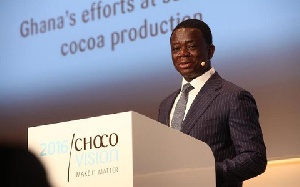 Dr Opuni and Seidu Agongo are facing 27 criminal charges
Dr Opuni and Seidu Agongo are facing 27 criminal charges
Ex-CEO of Ghana Cocoa Board (COCOBOD), Dr Stephen Opuni has filed a motion at the High Court demanding copies of 13 documents that the prosecution intends using against him in the GHS217million financial loss case brought against him and two others.
Dr Opuni, businessman Seidu Agongo and his company AgriCult Company Limited, are facing 27 criminal charges in connection with the supply of fertilisers to COCOBOD in three separate contracts, which include GHS43.1million (2013/2014 cocoa farming season), GHS75.3million (2014/2015 cocoa farming season) and GHS98.9million (2015/2016 cocoa farming season) totalling GHS217million through sole-sourcing, the state claimed, adding that procurement procedures for sole-sourcing were not followed.
The motion, filed through his lawyers, said: “I also do not have copies of any of the letters and or documents mentioned and or referred to by the Prosecution in the facts.”
“I am entitled as of right to all facilities which the prosecution intends to use at the trial. This is to enable myself and my Counsel prepare for the trial.”
“…I have been further advised by Counsel and verily believe same to be true that on a true and proper interpretation of Article 19(2) (e) and (g) of the 1992 Constitution, I am entitled as of right to copies of all including the contracts and numerous letters referred to by the Prosecution,” parts of the motion read.
Background
Attorney General Gloria Akuffo had told the court on Tuesday, 26 March that Mr Agongo, acting on behalf of AgriCult Ghana Limited, submitted to the Cocoa Research Institute of Ghana (CRIG), a fertiliser sample for testing. The testing was supposed to be in two phases: applied to seedlings and applied to mature plants for at least two planting seasons.
The AG said the testing was carried out for only the first phase after which a report recommending use of the Lithovit Foliar fertiliser was given without the second-phase testing.
Ms Akuffo argued that investigations revealed that Dr Opuni wrote to CRIG asking that they shorten the testing period. Dr Opuni, she said, subsequently wrote to Mr Agongo that his fertiliser had been certified for use on cocoa after which a certificate was issued by CRIG.
She said AgriCult, despite not applying for renewal of certificate for 2015 and 2016 as required, had its licence renewed upon the instance of Dr Opuni, without any testing.
Dr Opuni, then, according to Ms Akuffo, applied to the Public Procurement Authority for approval for AgriCult Ghana Limited to be single-sourced to procure 700,000 litres of the fertiliser, although conditions for single-sourcing had not been satisfied.
In that letter, Ms Akuffo said Dr Opuni stated the price as $19,250,000. She averred that the nature of the product was captured as liquid despite it being in powdery form.
The AG further told the court that as of the time of writing to the PPA, AgriCult had not written to COCOBOD stating any price as required by law.
The Public Procurement Authority then, she said, wrote to the COCOBOD boss requesting for value-for-money analysis.
Dr Opuni, Ms Akuffo continued, did not provide the value-for-money analysis but rather misrepresented the facts to the PPA that in compliance with advice from its Board in 2008, AgriCult Ghana Limited had been pre-qualified for the supply of the fertiliser, although, according to the AG, he knew this was not true.
She said based on Dr Opuni’s misrepresentation, the PPA Board approved COCOBOD's request for the single-sourcing of 700,000 litres of the fertiliser.
In 2014, Dr Opuni, according to Ms Akuffo, once again wrote to the PPA requesting approval to hand AgriCult a contract to supply liquid fertiliser through sole-sourcing even though conditions had not been met.
The AG said the PPA approved this request and Dr Opuni then put in another request which was also approved.
In November 2015, the PPA, Ms Akuffo said, approved the application for single-source procurement.
She said three separate agreements were signed and executed by Mr Agongo's AgriCult Ghana Limited.
Subsequent investigations, she said, had revealed that the contracts were executed when the company did not have a valid certificate to supply the fertiliser.
Whereas the material safety data sheet accompanying the fertiliser that was originally submitted to CRIG for testing described the substance as powdery, Dr Opuni, in requesting quotations for supply and delivery under the three contracts, referred to the fertiliser as liquid and quoted in litres, the AG said.
She continued that when the products arrived in Ghana, COCOBOD was required to notify CRIG for testing to ensure it corresponded with what was tested by CRIG but no such testing was done.
In 2017, she said COCOBOD carried out an audit into testing of fertilisers after which it referred the matter for criminal investigations. The investigations, the AG said, established that the product supplied by AgriCult Ghana Limited, was different from the sample submitted to CRIG for testing.
Further tests, she said, revealed variously that the fertiliser supplied had been adulterated and did not meet the specified standard and that the product could not be used as nutrient on cocoa. Furthermore, she added, the test indicated that the fertiliser could be harmful to humans and animals as well hazardous to water.
She said even though COCOBOD had spent $55million on the fertiliser, COCOBOD's records showed there was no significant increase in the cocoa yield during the period.
Investigations, she stated, established that Mr Agongo deposited an amount of GHS25,000 into the account of Dr Opuni to influence the award of contracts.